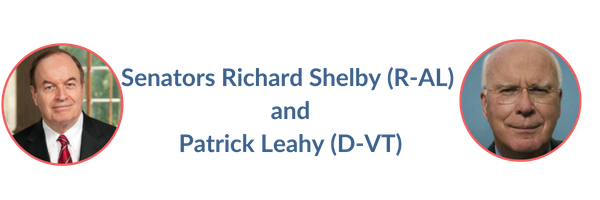In this hyper-partisan era, it often feels like Congress is in a perpetual state of dysfunction and gridlock—and the doom-and-gloom headlines certainly feed that sentiment. But there’s still a reason to have hope that a revitalized Congress could be on the horizon. Here’s why: dozens of bold members of Congress are actively pushing past partisan politics to build consensus on some of America’s most important issues. They’re the ones setting a new example for American government—one rooted in civil debate, bipartisan effort, and policies over politics.
Now’s not the time to lose optimism. This is a moment to activate our members of Congress, advocate for change, and applaud those who are restoring American democracy:

There’s one big issue on which both parties agree: the budget process needs reform. But Senators Richard Shelby and Patrick Leahy, chairman and ranking member of the Senate Appropriations Committee, respectively, are coming together across the aisle to avoid a future government shutdown in an unlikely, bipartisan way. The pair has already taken one vital step toward reversing the dysfunctional spending process that has paralyzed Congress by eliminating the practice of putting often-divisive policy provisions in spending bills (so-called poison pill riders). These measures unnecessarily entangle annual spending bills and spark funding brawls. This was no small feat, but it’s a huge step towards ensuring a more normal appropriations process. In fact, one-quarter of the 12 annual spending bills have already passed the Senate.
The following legislators are the winners of the Bipartisan Policy Center’s 2018 Legislative Action Award, which celebrates creative and courageous members of Congress who are breathing life into the legislative process.

65% of the bills Senator Gardner has sponsored in the 115th Congress have garnered either all Democrat or bipartisan co-sponsorship. Senator Gardner has worked with colleagues across the aisle on some of America’s hottest issues, including DACA and pressuring North Korea and its enablers. Aside from co-sponsoring the Dream Act of 2017 and introducing the Leverage to Enhance Effective Diplomacy Act of 2017, Senator Gardner has also worked with a bipartisan group of Senate colleagues to improve cybersecurity and energy conservation standards.

Senator King, one of the Senate’s two independents, does not shy from building consensus among Republicans and Democrats on tough issues. Senator King convened the Senate Governors Caucus for a discussion on Medicaid and Affordable Care Act Reform. He’s also introduced a number of bipartisan pieces of legislation to help everyday Americans, like the Community Bank Relief Act, which broadens small bank lending opportunities that will provide families and small businesses better credit options, and The Repay Act, which aims to reform and simplify federal student loan repayment programs. In 2016, the Bipartisan Policy Center praised King for introducing the bipartisan Senior Home Modification Assistance Initiative Act of 2016, which helps make independent living in later life less burdensome.

Representative Brooks, who leads the Bipartisan Congressional Caucus for Women’s Issues, is no stranger to working with colleagues across the aisle on key issues, particularly public health. Representative Brooks introduced the Strengthening Public Health Emergency Response Act of 2015 to dramatically transform and enhance the nation’s ability to respond to current and emerging biothreats. It was recognized by the bipartisan Blue Ribbon Panel Study on Biodefense as an important step towards shoring up our national security and preparedness for biothreats. She was also awarded the Congressional Leadership Award by the Community Anti-Drug Coalitions of America for her work to address the heroin and opioid epidemic.

Known as a “bipartisan workhorse” and a member of the Problem Solvers Caucus, a bipartisan group committed to forging cooperation on key issues, Representative Ruiz has championed bipartisanship in several issue areas. One area where he’s been vocal is bringing together colleagues from both sides of the aisle to help our nation’s military heroes. He teamed up with Republican Representative Chris Gibson to cosponsor the bipartisan 21st Century Health Care for Heroes Act, which aims to improve the delivery of veterans’ health care by merging the electronic health records of the Department of Veterans Affairs and the Department of Defense. Hear the other areas he’s worked to build a bipartisan consensus on the Bipartisan Backstory podcast.